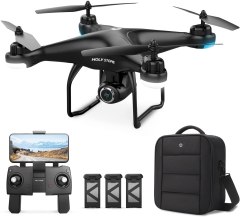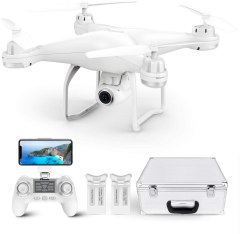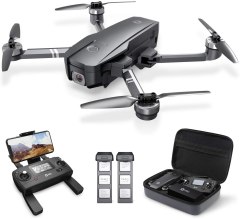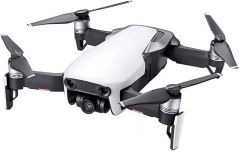Buying guide for best auto-follow drones
The popularity of the consumer level drone has grown tremendously in the last few years. If there were ever questions about how the general public would use a device once generally only utilized by the military, those questions have been answered in the form of spectacular aerial photographs and videos shot by practicing or professional visual artists alike. They’ve also been useful in aerial viewing of areas destroyed by natural disasters that are not safe to enter on the ground.
With this increase in popularity comes the need to develop a product that is more practical and easier to use. Auto-follow drones allow users to select a target for their drone’s camera to “lock on” and follow, while it continues to capture high-quality footage from its drone or aerial view. This feature gives creators even more flexibility and freedom to create images, scenarios, or stories without the need to manually control their drone as the subject of the shot, or drone operator, moves around.
If you’re ready to buy an auto-follow drone, check out our top recommended models. Read on to learn all the basics about these cool drones.
Auto-follow drone considerations
Many of the things you’ll need to consider when shopping for an auto-follow drone are the same as shopping for any drone. Even if you are considering an auto-follow drone, you should be mindful of its size, how it’s powered and recharged, and ultimately who will fly it and how they will control it.
Size
If you are looking to add another piece of equipment to your video or photography production setup, you may want to consider the size of your drone and how much space it may take up during travel. While many drones highlight the fact that they are small and can fit in your pocket, others sacrifice small size for added features, power, and stability while in the air. Seasoned drone veterans may not be intimidated by such a small device flying hundreds of feet in the air and out of sight, while others may want something a bit larger to control.
Battery Type
You’ll want to be aware of how your drone is powered so that you understand how it’s going to fit into your production arsenal. Almost every drone on the market simply does not have a long flight time before the battery drains, so you may need backup batteries or ones that charge quickly.
Some of the smaller drones allow you to charge the body directly via USB or AC adaptor. However, most of the higher quality professional drones will come with a battery that needs to be charged outside of the drone's body. This allows for multiple batteries to stay charged, which leads to longer flight times or quick battery changes to get your device back in the air.
Keep in mind that how these batteries are charged will vary as well. Some will allow for a USB connection, which can be extremely convenient. Top-of-the-line drones will typically desire a more powerful charge and require an AC connection.
Remote Control
Many of the high-grade drones that boast the auto-follow feature will come with their own remote. Professional drones tend to take advantage of the industry standard dual-stick quadcopter controls. These controls will take some getting used to as there is a slight learning curve. There are many resources online for users to find information on how to fly, and with just a little bit of practice, the basic controls can be learned quickly.
Other drone products look to simplify the flying experience with remotes of their own. Many of these brands attempt to make flight controls more intuitive or allow users to use hand gestures to maneuver the drone. Some of these products work great, but typically these control variations aren’t as popular for the simple fact that once you’re able to learn standard quadcopter controls, you’re prepared to fly any quadcopter.
Auto-follow drone features
Auto-follow vs. tracking
Note that many companies will use these words interchangeably, but so you’re aware of the types of technology available, there’s is a slight difference between some “auto-follow” features and some “tracking” features.
- Auto-follow can be done without the use of the drone's camera. In fact, many drones that don’t have cameras can still take advantage of an auto-follow feature. The drone uses communication with the remote (or smartphone) to stay in range, follow it wherever it goes, or return to home.
- Tracking takes advantage of the drone’s HD camera and fixes itself on a selected target. Once a subject is selected (often the pilot’s face), the drone has the ability to not only keep a specific distance but also follow it with its camera, allowing the subject to move freely. This can also allow the drone operator to fly freely while the camera stays focused on the subject. This amount of flexibility can set the stage for some incredible shots.
Mobile Apps
Most drones that feature an HD camera and tracking applications will allow for mobile support. This will ensure that anyone controlling the drone is able to see, and control, what the drone sees while in the air.
Be sure that whatever downloadable apps are available can work with your current phone or mobile device (i.e. Android or iOS). Most applications are free and available in Android or iOS stores or will be made available with the purchase of your drone. Applications won’t be the same across brands, so each interface may take some time to learn.
Did you know?
The world record for the fastest drone is 163.5 mph. Consumer drones are much slower, with most only reaching 50 mph.
STAFF
BestReviews
Auto-follow drone prices
The auto-follow feature is an important one, as it gives the operator more control over their machine. When you take into consideration the tracking feature, you’ll likely see a spike in overall pricing.
Low-priced: $50 to $150
Any drones for less than $150, even if they still boast a camera, are considered low end or are designed for kids or beginners. Typically, you’ll miss out on advanced tracking systems, long lasting batteries, and high definition cameras. If it does feature an auto-follow mode, that means that it will simply stay within a certain distance of the remote, or just return to home when called. These are great drones to practice quad controls with or buy for first time drone enthusiast.
Mid-range: $200 to $500
In this range you’ll find affordable professional grade drones with most of the bells and whistles to enjoy tracking, long flights, and high definition images. You may not find the most powerful systems or the newest technology here, but when new tech comes along, this is where the previous generation will fall, so you’ll easily find top-notch products within this price range.
High-priced: $700+
This is where you’ll find the top flight, cutting-edge auto-follow drones. As auto and tracking systems improve, piloting your drone will become more about setting targets and checkpoints than manually controlling every twist and turn. However, these systems are likely only to go in the most expensive products on the market, so you should still know how to manually control your drone if you’re going to spend top dollar on your device. If you’re confident in your ability to fly, and want the best of the best, this is what you can expect to pay.
Tips
Even though your next drone may come equipped with auto-follow features, that doesn’t mean that you’ll never have to do any work. Here are a few tips on getting the most out of your device while flying it safely and effectively.
- Even with the auto-follow and targeting features, it’s important to always keep an eye on your drone when it’s in the air. After spending hundreds of dollars on a powerful device, you don’t want to lose it in a tree or have someone take it if it lands out of sight.
- If you are just entering the drone space, or have very little experience flying, start off learning to fly with an inexpensive model. Most quadcopters use the same controller functions, and you’ll be able to fly freely without the concern of damaging an expensive piece of equipment.
- Read up on the rules and regulations of your city and state laws (or wherever you want to fly it) on drone use. Federally, you will need to register your drone with the Federal Aviation Administration (FAA). You’ll also need to make sure that you are in the legal airspace when flying. There are apps available that will tell you where you are and if you need to contact any airport towers for authorization.
FAQ
Q: How long can a typical drone stay in the air on one charge?
A. Consumer drones are limited in how long they can stay in the air. The best drones on the consumer market can typically keep flight for a maximum of 25 minutes.
Q: How fast can a consumer drone fly?
A. This depends entirely on the size, power, and hardware features of the drone, but because consumer drones are limited, they tend to max out at 50 mph.
Q: Can I record directly to my phone or mobile device?
A. Typically, drones will feature a memory card that’s attached to the camera. Even if you can stream footage to your phone, you’re likely recording the information to the memory card that’s located in the drone itself.
























